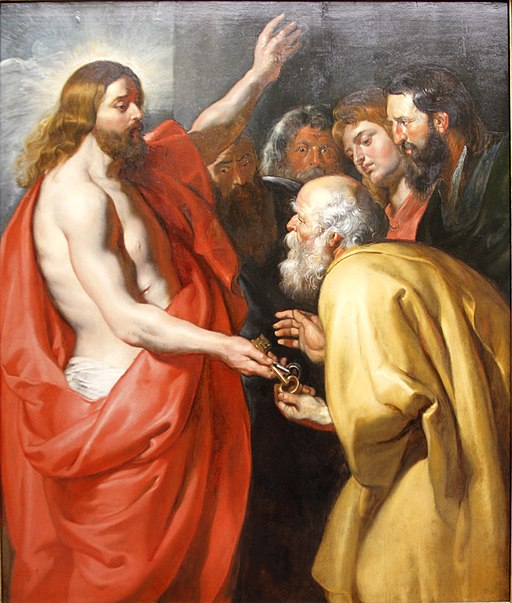There is something truly remarkable about this passage for our understanding of the Church. The episode recounted in this passage of the Gospel is situated right after Jesus’ admonishment that the Apostles should guard against the leaven, or the teaching, of the Pharisees and Sadducees. These religious leaders believed that they were the authority and could determine the criteria for what is true. Even though Truth himself stood before them—he who taught and healed and even raised the dead—it was not enough for them to bend their minds and hearts in humble submission.
Directly after this passage, the apostle Peter takes the “authority” in his own hands. On his own cognition he decides to rebuke Jesus who declares that he will suffer in Jerusalem and be killed and on the third day be raised to life. Peter admonishes, “Never, Lord, never will this happen to you!”
In between these two exercises of personal authority, is this exquisite episode of Peter’s profession of faith and commission. In these verses, our faith can find rest with greater security, for it is clear that God himself chooses to communicate his truth and way and life, and he does so through human beings.
“I say to you, you are Peter…Upon this rock I will build my Church…I will give you the keys to the Kingdom of heaven.”
Jesus himself is the authority by which Peter will guide the Church. Inasmuch as Peter is faithful to Christ and his teaching, the apostle’s teaching will be true and reliable. As soon as Peter begins to take matters into his own hands in rebuking Jesus, the text makes clear that Jesus remains the authority.
The Church is a divine creation and a project of God’s love. Not only Peter, but all of us are responsible to the one authority, the One who is the Way, Truth, and Life. How easy it is to fool ourselves into believing that we know something, that we even know more than God himself.
Throughout the rest of Peter’s experiences with Jesus, as recorded in the Gospels, we discover a man with an immense love and a wavering faith, a man who is step-by-step being led into humble submission to Jesus in all things. In the Acts of the Apostles, we witness an apostle who allows himself to be led by Jesus in the first decisions the community of Jesus’ followers needed to make.
In his first letter Peter urges us all: “All of you, clothe yourselves with humility in your dealings with one another, for: ‘God opposes the proud but bestows favor on the humble.’ “So humble yourselves under the mighty hand of God, that he may exalt you in due time” (1 Peter 5:5b-6).
Hay algo verdaderamente notable en este pasaje para nuestra comprensión de la Iglesia. El episodio narrado en este pasaje del Evangelio se sitúa inmediatamente después de la amonestación de Jesús de que los Apóstoles debían guardarse de la levadura o enseñanza de los fariseos y saduceos. Estos líderes religiosos creían que eran la autoridad y podían determinar los criterios de lo que era la verdad. Aunque la Verdad misma estuvo ante ellos, el que enseñaba, sanaba e incluso resucitaba a los muertos, no fue suficiente para ellos doblegar sus mentes y corazones en humilde sumisión.
Inmediatamente después de este pasaje, el apóstol Pedro toma la “autoridad” en sus propias manos. Por su propio conocimiento decide reprender a Jesús quien declara que sufrirá en Jerusalén y será asesinado y al tercer día resucitará. Pedro advierte: “¡Nunca, Señor, nunca te sucederá esto!”
Entre estos dos ejercicios de autoridad personal, se encuentra este exquisito episodio de la profesión de fe y la comisión de Pedro. En estos versículos nuestra fe puede encontrar descanso con mayor seguridad, porque está claro que Dios mismo elige comunicar su verdad, su camino y su vida, y lo hace a través de los seres humanos.
“Te digo, tú eres Pedro… Sobre esta roca edificaré mi Iglesia… Te daré las llaves del Reino de los cielos”.
El mismo Jesús es la autoridad por la cual Pedro guiará a la Iglesia. En la medida en que Pedro sea fiel a Cristo y a sus enseñanzas, las enseñanzas del Apóstol serán verdaderas y confiables. Tan pronto como Pedro comienza a tomar las cosas en sus propias manos al reprender a Jesús, el pasaje deja claro que Jesús sigue siendo la autoridad.
La Iglesia es un establecimiento divino y un proyecto del amor de Dios. No sólo Pedro, sino todos nosotros somos responsables ante una única autoridad, Aquel que es el Camino, la Verdad y la Vida. Qué fácil es engañarnos haciéndonos creer que sabemos algo, que sabemos incluso más que Dios mismo.
A lo largo del resto de las experiencias de Pedro con Jesús, tal como se registran en los Evangelios, descubrimos a un hombre con un amor inmenso y una fe vacilante, un hombre que paso a paso es conducido a una humilde sumisión a Jesús en todas las cosas. En los Hechos de los Apóstoles somos testigos de un Apóstol que se deja guiar por Jesús en las primeras decisiones que debía tomar la comunidad de seguidores de Jesús.
En su primera carta, Pedro nos motiva a todos: “Vístanse todos de humildad en su trato unos con otros, porque: ‘Dios se opone a los soberbios pero concede favor a los humildes’. “Humíllense, pues, bajo la poderosa mano de Dios, para que él los exalte a su debido tiempo” (1 Pedro 5,5b-6).

Sr. Kathryn James Hermes, FSP, is an author and offers online evangelization as well as spiritual formation for people on their journey of spiritual transformation and inner healing. Website: www.touchingthesunrise.com My Books: https://touchingthesunrise.com/books/
Public Facebook Group: https://www.facebook.com/groups/srkathrynhermes/ HeartWork Spiritual Formation Group: https://touchingthesunrise.com/heartwork/
Feature Image Credit: José Luiz Bernardes Ribeiro, commons.wikimedia.org/wiki/File:Christ_giving_the_Keys_of_Heaven_to_St._Peter_by_Peter_Paul_Rubens_-_Gem%C3%A4ldegalerie_-_Berlin_-_Germany_2017.jpg

